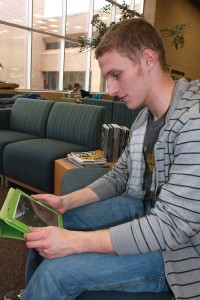
By Rhiannon Saegert/nw news editor
Students now have perpetual access to all of the campus libraries’ resources,
thanks to e-books and video streaming.
Combined, TCC’s libraries now have 68,162 e-books available, not counting the new collection of magazines added this year. Also, 701 audiobooks and 2,793 videos are available for streaming, and more electronic material is on the way.
“If a student wanted to do their research at 3 a.m. in their pajamas, I think they could do it,” said NW director of library services Sandra McCurdy.
E-books are available to one or more people at a time, depending on the title. Right now, most are only available to one student at a time. Starting this year, libraries can order individual titles through the database EBSCOhost, rather than buying entire sets of e-books at one time.
“Slowly but surely, we get the word out,” McCurdy said, “but there’s certainly more we can do to let students know that is an option.”
TR’s library has encouraged e-books since the campus opened. The library has e-book readers available for students and faculty to rent. However, the goal is not to do away with print books completely.
“Our campus is the most recent. We were able to acquire more e-materials to begin with,” said TR Campus library services director Carol Everhart. “As the library looks at materials they purchase, they look at what it is students are asking for. It’s not a dedicated move to e-materials. We’re trying to create a balance.”
Everhart said e-books are popular, and the benefits are obvious, but getting them has not always been easy.
“It has not been a really easy transition, but as technology increases and contracts improve, it becomes more necessary,” Everhart said. “There are people who prefer e-materials and people who prefer print materials, and so having a balance is what we strive for.”
NE’s library also tries to balance electronic and print material.
“We’re the largest library, and that gives us room to keep more books,” NE library director Mark Dolive said.
For example, NE has a legal reference section, which is unique to that campus. Dolive said the campus will soon gain about 40,000 new online books.
The district’s new library website will help students find e-books.
“It looks completely different,” Dolive said. “The main thing is that it has a Google-type bar that will search everything.”
The new search bar brings up results from every category, which the student then narrows down.
“You have 1,000 books available to you continuously,” South Campus library technology manager Bruce Turner said. “You just do a search, and it’s right there for you to use.”
South library services assistant director Erik D. France said the library wants to integrate wireless technology as quickly as possible and let students explore the e-books they can check out.
To this end, South’s library has added group study workrooms with wall-mounted touchscreen monitors and cameras for students. South also has tablets staff may rent, but they are not available for students.
“We will continue to maintain physical books, but we’re moving towards e-books, especially with the reference section,” France said.
Once reference books are available online, the previously protected printed copies are then put in circulation and allowed to be checked out normally. Almost all of the campus libraries have begun putting their reference material in circulation.
SE library services director Jo Klemm said while the new search engine has made e-books more evident, SE’s library is in no hurry to start collecting e-books en masse. SE has chosen to hold off for two reasons.
“We have found that given the choice, students generally choose print books over e-books at this point,” she said.
The second reason, Klemm said, is the question of ownership. Once a library purchases an e-book, to what extent does the library own it? Each vendor has its own policy.
“I have not found an answer anywhere in industry or in journals that has addressed [the question] to my satisfaction,” Klemm said.
Klemm said in the past, e-books were purchased by the district as a whole, but starting this semester, each library will purchase e-books individually. However, it will be a few semesters before SE begins buying as many e-books as other campuses.
“I’m a little reluctant to jump off into the deep end, but I may just be old-fashioned,” she said “However, I really truly am listening to what students want, and when I hear them asking for e-books, I’ll start buying them.”
